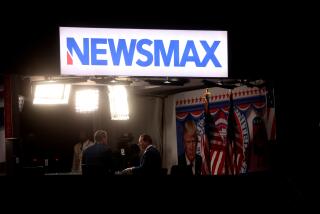Court Rejects Argument by Mass Media in Libel Case
- Share via
SAN FRANCISCO — The state Supreme Court, rebuffing major news organizations in California, ruled Thursday that private individuals can sue for libel even if a story that defames them with false information is published without malice and is in the public interest.
In a unanimous ruling, the court held that California’s statute governing libel does not shield news organizations from suits by private figures simply because an article or broadcast is in the public interest.
“If the Legislature had intended to create a broad public interest privilege for the news media, the Legislature could easily have done so in reasonably clear language,” Justice David Eagleson said in the opinion.
Attorneys for the news organizations had urged the court to bar libel suits if a news report, though false, is published or broadcast without malice and in the public interest.
Breadth of Privilege Cited
“Most important, the privilege sought by defendants would be so broad that it would apply to almost every defamatory communication,” the court said.
“Presumably, the news media generally publish and broadcast only matter that the media believe are of public interest, and the media defendant in every defamation action would therefore argue that the communication was a matter of public interest.”
The U.S. Supreme Court has made it difficult for public figures, such as government officials or celebrities, to sue for libel successfully. They must show that a news organization reported a story maliciously--knowing or having strong reason to believe that the report was false. But the federal court has left it to states to determine libel standards for people who are not in the public eye.
With Thursday’s ruling in the first libel case to come before the court headed by Chief Justice Malcolm M. Lucas, California joined three dozen other states in allowing private figures to win libel suits by proving that a news organization was merely negligent in publishing or airing a false and defamatory news story.
“We see no reason to deny California citizens protection for their reputations equal to that provided in other states,” the court said.
The ruling involved two 1984 stories by KCRA-TV in Sacramento, which is owned by Kelly Broadcasting Co. In a consumer affairs segment, the station reported on two homeowners’ complaints about a contractor performing federally financed home improvement work.
The contractor, Shirley Brown, sued, contending that other contractors did the work mentioned in the reports. She maintained that the reporter made no effort to contact her, the station ignored her requests for a retraction and the Contractors’ State License Board told KCRA the complaints were baseless.
The station maintained the story, part of an investigation of the use of public funds, was a matter of public interest and should be immune from the suit. A state Court of Appeal rejected that argument.
More than a dozen print and broadcast organizations joined with the station in arguing the case. The organizations included Times Mirror Co., which publishes the Los Angeles Times; the New York Times; McClatchy Newspapers; Hearst Corp.; NBC; ABC, and CBS.
In a friend of the court brief, the organizations, led by the law firm of Gibson, Dunn & Crutcher, which represents The Times, argued that the standard imposed by the court on Thursday would hinder investigative and consumer-oriented reporting involving private businesses and individuals.
“The effect is that the press is going to be much more reluctant to write stories about disputes involving private figures. The kind of consumer report involved here is going to be a much riskier proposition,” said Rex S. Heinke, who helped argue the case on behalf of the news organizations.
But the high court concluded that “a person is not a public figure merely because he happens to be involved in a controversy that is newsworthy.”
“On a practical level,” the court continued, “private individuals have less opportunity than public officials and public figures to effectively counteract false statements and are more vulnerable to injury.”
Contending that news organizations have “enormous financial resources,” Eagleson said, “when they negligently defame a private person, it is not unfair for them to pay for the injury.”
“The injuries suffered from defamation can be more real and debilitating--at least emotionally and financially--than palpable physical injuries and are equally worthy of compensation,” he wrote in the 74-page decision.
More to Read
Sign up for Essential California
The most important California stories and recommendations in your inbox every morning.
You may occasionally receive promotional content from the Los Angeles Times.













